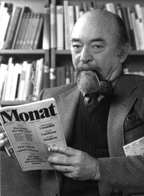Melvin J. Lasky
| Melvin Jonah Lasky | |
|---|---|
 |
|
| Born | January 15, 1920 New York, NY, USA |
| Died |
May 19, 2004 (aged 84) Berlin, Germany |
| Nationality | Polish-American |
| Alma mater | University of Michigan |
| Occupation | editor, journalist, author |
| Spouse(s) | Brigitte (Newiger) Lasky, Helga Hegewisch |
| Children | Vivienne Lasky, Oliver Lasky |
Melvin Jonah Lasky (15 January 1920 – 19 May 2004) was an American journalist, intellectual, and member of the anti-Communist left. He founded the German journal Der Monat in 1948 and, from 1958 to 1991, edited Encounter, one of many journals revealed to have been secretly funded by the CIA through the Congress for Cultural Freedom (CCF).
From 1950 to 1963, the CIA covertly supported the CCF and a number of its publications, including Encounter. While Lasky did admit he knew of the CIA's role as a funding source prior to its reveal in 1966, rumors that he was a CIA agent have not been substantiated by evidence. In 1947, Lasky wrote an influential document that made the case for a cultural Cold War intended to win over European intellectuals.
He was the older brother of Floria Lasky, an influential entertainment lawyer, and Joyce Lasky Reed, the President and founder of the Fabergé Arts Foundation and former Director of European Affairs at the American Enterprise Institute.
Lasky was born in The Bronx of New York City and schooled at City College of New York. He continued his education at University of Michigan and Columbia University. He briefly considered himself a Trotskyist but at 22 moved away from communism entirely because of disgust with Stalin. He began working for the New Leader in New York and was editor from 1942–1943. Lasky wrote an editorial during this time criticizing the Allies for failing to address The Holocaust directly in their World War II efforts.
He served in World War II as a combat historian for the 7th Army. Lasky remained in Germany after the war, making his home in Berlin, where he worked for American military governor Lucius D. Clay. During this time, Lasky was an outspoken critic of the United States' earlier reluctance to intervene to stop the genocide of European Jews.
...
Wikipedia
